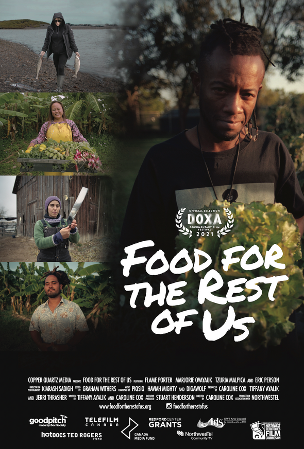
Food For The Rest of Us 2020
Distributed by Collective Eye Films, 1315 SE 20th Ave. #3, Portland OR 97214; 971-236-2056
Produced by Tiffany Ayalik, Caroline Cox, Stuart Henderson, Dustin Milligan, and Jerri Thrasher
Directed by Caroline Cox
Streaming, 83 mins
Middle School - General Adult
Agriculture; Communities; Food Justice
Date Entered: 03/14/2022
Reviewed by Jaquair L. Gillette, Actor/Filmmaker/Library PatronOpening with a foreground close up of flowers beginning to bloom and a man walking in the background we are then taken to several different landscapes showing the central characters from each of those spaces. Caroline Cox’s, Food For The Rest of Us is a story centered on four individuals and communities including, an indigenous-owned youth organic farm in Hawaii, an African American urban farmer in Kansas City, a Mexican/Jewish Kosher Butcher, and an Inuit community living on the Arctic Coast. We see the leaders of these different communities' grapple with fighting against poverty, systemic injustice, the legacy of colonialism, and climate change.
Ma’O Organic Farm in Hawaii has a mission to grow organic food while empowering the youth where the US military and resorts are exploiting resources. On the East High School campus Eric Person and his Kansas City Aquaponics entity battles systemic racist policies of the Midwest while trying to cultivate the next generation of urban farmers through workshops and training. Inuit Elder Marjorie Ovauyak and her North Arctic community are reliant on fishing and hunting. They begin using greenhouse gardening as a way to help them persevere through residential school trauma and the real time effects of climate change. Tzuria is of Mexican and Jewish ancestry and challenges her culture’s gender roles in practicing Kosher butchering while teaching other women and members of the Queer Community Organization in Colorado.
Caroline Cox and her team break this film down into three acts that give the viewer backstory, where they are today, and where they plan to be in the future. The story flow is very succinct and brings the viewer on a journey with four different stories following the layout of the acts. The capturing of the environments as the characters of each community describes the conditions brings the audience in as witnesses to what is happening. The camera and score pick up the universal connection of spirituality the characters have with the land. The scenes when Eric Person speaks on the spirituality of farming and that of Jerri Thrasher speaking on Inuit community’s land was captured adequately in relaying the spirit of the scene to audiences.
Food For The Rest of Us is recommended for anyone studying agriculture, social ecology, and food studies/ food justice. I also recommend it for anyone interested in starting an organization or entity dealing with food justice in general or community gardens, in particular. This film deals with the idea of community farming as independence and revolutionary. In fact, the most profound question raised in the film by Thrasher was, “When their towers crumble and the money's gone, what are you going to eat?”
Awards:A Good Pitch Vancouver 2020 Winner and Official Selection of DOXA 2020
Published and licensed under the Creative Commons Attribution 4.0 license. Anyone can use these reviews, so long as they comply with the terms of the license.